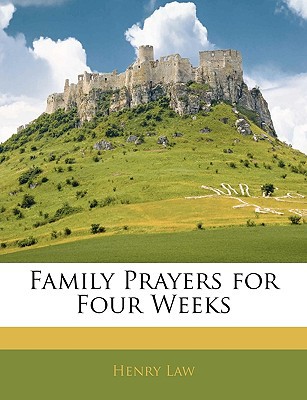

 |

|

The average rating for Family Prayers for Four Weeks based on 2 reviews is 5 stars.
Review # 1 was written on 2019-01-10 00:00:00 Tyler Martin Tyler MartinA Sure Guide to Prayer Everyone should have a book of prayers, not as a substitute for his or her own prayers, of course, but as a prompt for prayer, as a model for how to proceed, and as an incitement to undertake the work. This book, Henry Law’s “Family Prayers,” would be fitting for each of these purposes and a sure guide to prayer. The language is elevated—some might say dated—due to the fact that the author lived and wrote in nineteenth century England. I hope potential readers will not dismiss the book on that account. If you read Mr. Law’s prayers closely and attentively, you will find yourself drawn into a deeper affection for God and a greater desire for the things of God. Nor should you be put off by the title (“Family Prayers”) if you are looking for a personal prayer manual. The prayers are written in the first person plural, but they are easily adapted to private prayer. Of course, they are perfect for family worship. There are four weeks of daily morning and evening prayers and, in addition, prayers for special occasions (Good Friday, Easter, Pentecost, etc.) and for special needs (sickness, grief, harvest, etc.). The prayers BREATHE Scripture. Mr. Law undoubtedly absorbed the Bible in his own study and devotions, and it shows in his prayers. If you invest yourself in this book, you will be rehearsed in praise, confession, thanksgiving, and petition. And you will be given language for exalting the Triune God, Father, Son, and Holy Spirit. Learn to pray or deepen your prayers by letting this servant of God from another era speak into your heart and set it ablaze anew with his own passion for God. |
Review # 2 was written on 2017-04-17 00:00:00 Jason Whipkey Jason WhipkeyDe Jure Belli ac Pacis means On the Justice of War and Peace in Greek. This is a kinda weird book, as far as books go, but pretty worthwhile in the end. The plot starts out real slow at first, and the characters are distant and hard to relate to. You really have to get used to Grotius' style, which is a little outdated because he was a Roman, and he references tons of Roman and other examples to bolster his arguments, sometimes even like 20 pages of examples, and by the end, you're like, OK I get it dude, Jesus said it was ok to have wars, or whatever. This book is really long, but I feel like in olden times, people maybe just wrote longer books, and you have to be patient about that because they say a lot of good stuff when you give them a chance. Grotius' main point is that there is a natural law in the world which governs even how countries have wars with each other, even though while they're having the war, it seems like they might not be governed by any laws at all, so many people have argued that there is no such law. But this natural law is not based on God or anything subjective or controversial like that (although God is cool with it). It's based on two things: the universally observable human impulse to defend himselves when he is under attack, and the equally universal fact that humans are sociable and want to live together. The first part justifies why war is justified in the first place, because we have a right to defend ourselves when we're attacked. But the second is really cool, because it limits the extent to which we can do the first part, so that we can't just do whatever we want in self-defense, like Mr. Tom Hobbes says thousands of years later, but we can only defend ourself to the degree that our defense promotes sociability, or maintains our society as a whole. That still means we can do a lot of badass stuff in war though. I'm not sure if I buy Grotius ultimately, because it's really hard to make countries follow laws when they are in wars and there is no way to hold them to the laws, or they feel existential about a particular war and conclude that they have to do whatever it takes to win it or be totally crushed, like what happened to the land of Carthage in Grotius' time. But for the most part, I feel like Grotius is really good to read when you get tired of some of the edgier authors in this genre like Bodin and Hobbes, because he has a more moderate idea about what a country's self-interest is, and thinks that laws about contract and property can be extrapolated from within a country to govern relations among countries. Especially for people who care about international law and human rights nowadays, it's really important for them to justify that without relying on different subjective religions, and if you think that Grotius' justifications are not that good, you need to think about whether you have any better ones. |
CAN'T FIND WHAT YOU'RE LOOKING FOR? CLICK HERE!!!